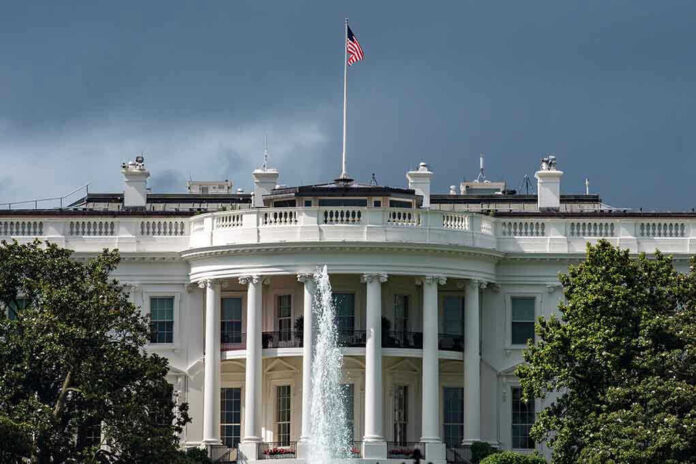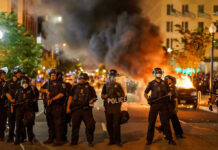
A recent security breach at the White House has reignited conservative concerns over national security and the lingering consequences of lax policies from prior administrations.
Story Snapshot
- A driver crashed into a White House security gate, raising new questions about the strength of federal security protocols.
- Authorities have not disclosed the driver’s motive, identity, or any direct connection to ongoing protests.
- Conservative Americans worry that years of leftist policies and government overreach have eroded fundamental national security safeguards.
- The Secret Service responded swiftly, but the incident highlights ongoing threats to the heart of American democracy.
White House Security Breach Sparks Renewed Debate
On the evening of October 21, 2025, an unidentified driver rammed a vehicle into a Secret Service checkpoint outside the White House. The incident resulted in the immediate arrest of the driver, who remains unnamed as of the latest official statements. No injuries were reported, and authorities have not confirmed whether the crash was deliberate or accidental. This event follows a period of heightened protests in major U.S. cities, though no direct link has been established between those demonstrations and the breach. The situation underscores persistent vulnerabilities at even the most secure government facilities.
This breach occurred at a time when many Americans, especially those who value strong national defense and law enforcement, are voicing frustration with the effects of so-called ‘woke’ and globalist agendas imposed by previous administrations. Years of left-leaning governance have left a legacy of weakened security and emboldened threats at home and abroad. Conservatives have repeatedly warned that policies prioritizing political correctness or open borders can erode essential protections and put the country at risk, a concern only amplified by incidents like this at the nation’s most iconic address.
Historical Patterns of Security Failures
The White House has faced several security incidents over the past decade, including a high-profile fence-scaling in 2014 and a vehicle attack in 2018. Each breach has resulted in temporary reviews and heightened security, but these reactive measures often fail to address systemic weaknesses. The ongoing trend of such incidents suggests that surface-level reforms may not be enough. Critics argue that only a comprehensive, America-first approach to security, driven by clear-eyed leadership and the restoration of law-and-order policies, can ensure the safety of our government institutions.
While the Secret Service successfully detained the driver and quickly secured the perimeter, the failure to prevent the breach in the first place raises fresh questions. Conservative observers argue that the persistent threat environment—fueled by anti-American protests and years of government overreach—demands more than bureaucratic tinkering. Instead, many believe the nation requires a decisive return to constitutional principles and robust, commonsense security measures that put American safety above all else.
Impact on Public Confidence and Conservative Values
This incident has immediate and long-term implications for those who cherish the Constitution, family values, and traditional American liberties. In the short term, increased security measures around the White House may disrupt daily life for residents and visitors. In the long term, the repeated occurrence of such breaches threatens to erode public confidence in government institutions and the effectiveness of law enforcement. Grassroots conservatives see these failures as direct consequences of policies that have prioritized political agendas over the fundamental duty to protect the nation and its people.
As the investigation continues, conservative Americans remain vigilant, demanding transparency and accountability from leadership. The expectation is clear: national security should never be compromised for the sake of political expediency or ideological experimentation. The Trump administration, now in its second term, faces the urgent task of restoring the rule of law, fortifying federal security, and rejecting any return to the failed approaches of the past. Only by reaffirming these core values can America remain safe, prosperous, and free for generations to come.















